The Shroom Boom: Four Generations of Organic Mushroom Farming at Far West Fungi
Sheree Bishop, Communications Coordinator
October 25, 2024
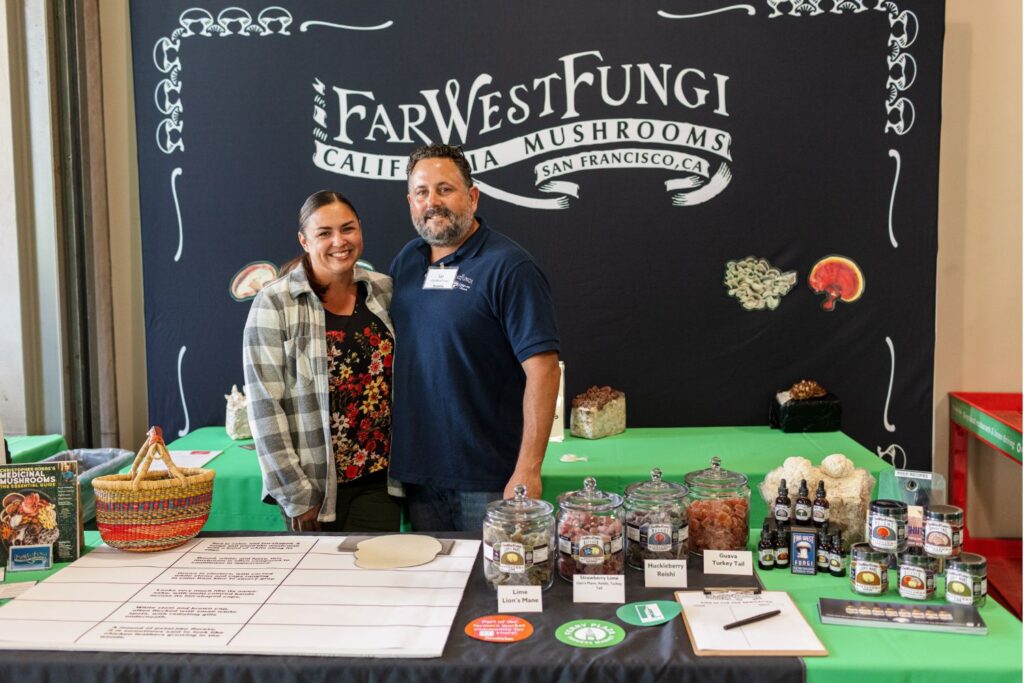
In recent years, the “Mushroom Boom” has turned these fantastic fungi from an offbeat, niche interest into a mainstream phenomenon. As awareness of fungi has grown in both the culinary world and popular culture, the public has also grown to love mushrooms in the same way that the Garrone family has across four generations. At Far West Fungi, their innovative uses for mushrooms have planted the spores for a tight-knit community of fungi fans and growers.
Ian Garrone has a passion for mushrooms that began when he was six years old. Throughout his childhood, he spent his weekends at the farmers market with his parents, trying new fruits and vegetables, making friends with farmers, and talking to shoppers about the fungi grown on his family’s farm.
These days, things have come full circle. Ian drops his kids off at the farmers market to work, and on his own, he checks up on the farmers that he grew up with whose children are now doing markets, too. At Far West Fungi, it’s normal to see multiple generations of a family working together. Across four generations, they’ve continued to discover new and exciting ways to incorporate mushrooms, both culinary and medicinal, into our diets.
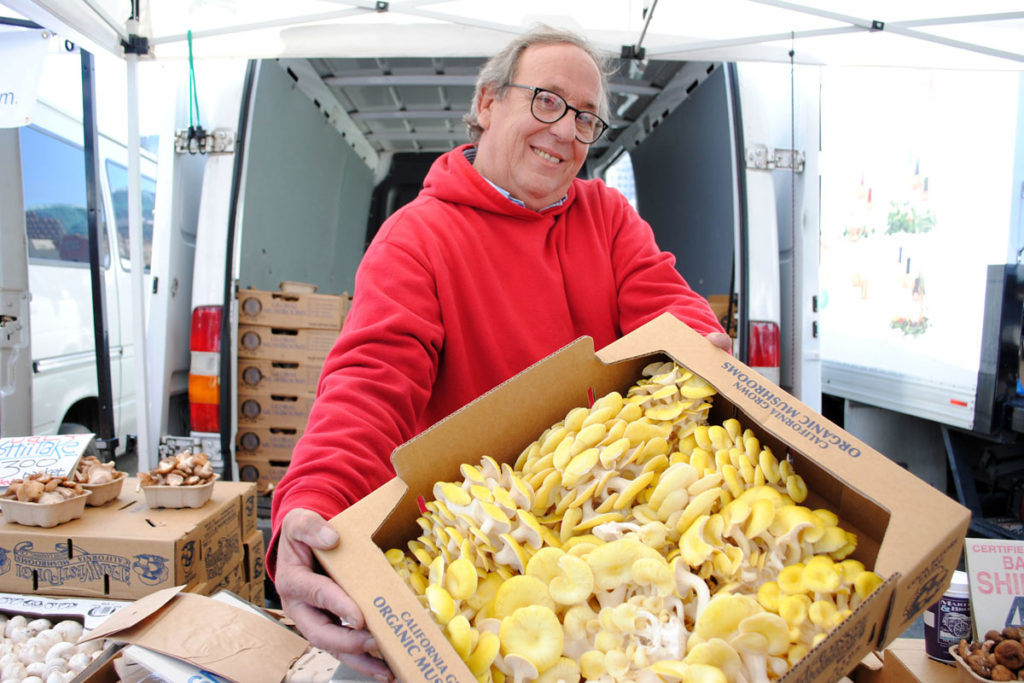
A Love for Mushrooms Runs in the Family
For over 50 years, the Garrone family has been growing high-quality mushrooms on their farm in Moss Landing, about 100 miles down the coast from San Francisco. Ian Garrone, along with his three brothers Kyle, Sean, and Loren, have taken on large roles in the company founded by their parents, John and Toby Garrone.
“I think my parents always felt like they wanted to make sure that all their kids had an out, that they weren’t tied into doing this. I was kind of the first one to decide that I’m going to be working on this full-time, not just a little bit at the farm and farmers markets. I really just submerged myself in everything,” Ian says.
One by one, his brothers followed suit. The second to join the family business was Kyle, who used his academic background in biology to help with growing mushrooms. After Kyle, Sean joined and used his expertise in sales to support Far West Fungi’s farmers markets. Then their brother Loren, who also has a business background, took a role focused on boosting the revenue of their business.
Today, there are about 17 Garrone family members involved in Far West Fungi, and the family operation isn’t limited to the Garrones. “Even our employees are multigenerational in working with us, which is pretty amazing,” Ian says.
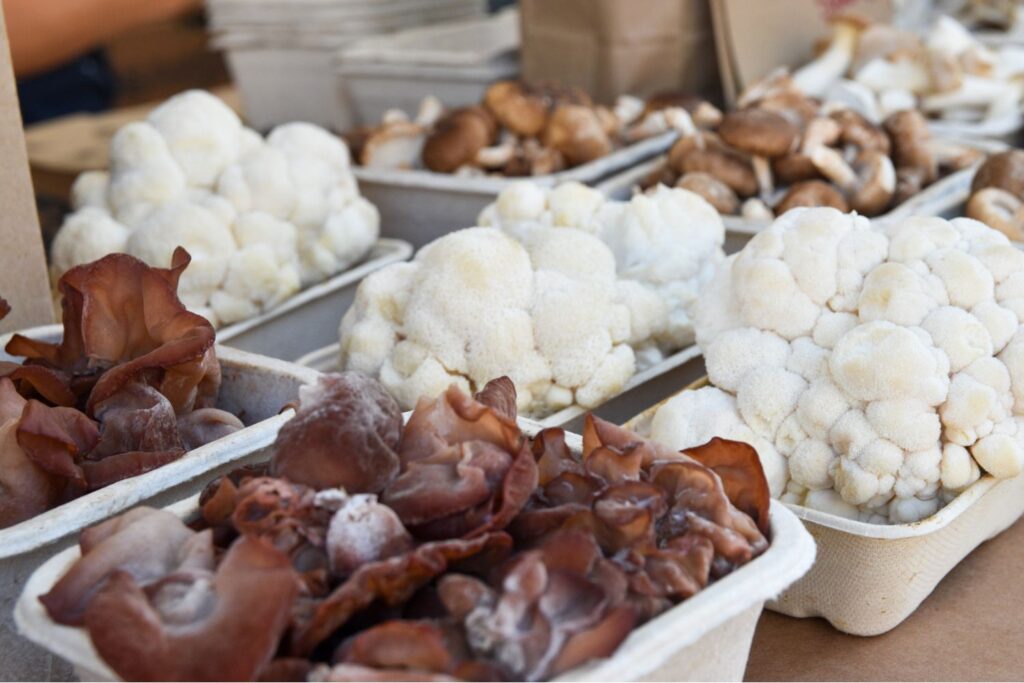
Finding New and Innovative Ways to Use Fungi
Far West Fungi got its start in various farmers markets in Northern California, including the Ferry Plaza Farmers Market, and later opened a shop inside the Ferry Building. According to Ian, most of their longtime customers show up at the farmers market on Saturday mornings.
“It’s still truly the backbone of our business. And it’s a very stable part of our business as well. We get a lot of feedback from our customers, and we try to offer what they want. We try to be playful with our product so that we’re teaching at the same time that we’re nourishing people,” Ian says.
Part of Far West Fungi’s appeal is in its selection of new and innovative mushroom products. Beyond the wide variety of culinary mushrooms like Tree Oysters, King Trumpets, Lion’s Manes, and Maitakes that they cultivate on their farm, they offer value-added products like tinctures, teas, powders, and more. In the future, fungi fans can look forward to mushroom cookies, mushroom tempura, and more medicinal products.
A study published by the National Institutes of Health confirms what Ian and many mushroom lovers know to be true: these fungi have many properties that support our health, including anti-inflammatory and antibacterial uses.
“We’re extracting out more of the medicinal properties that usually are tied to boosting your immune system. We’re researching ways that we can use that extracted mushroom into different products,” Ian shares. “One of the products we’re working on is a mushroom gummy, very similar to how you take your vitamin gummies now.”
Being playful with mushrooms includes giving people something special, and introducing them to a community of other mycology enthusiasts. The public will have their first taste of some new mushroom snacks and treats at the first annual Mushroom Festival at the Ferry Building and Ferry Plaza Farmers Market this weekend.
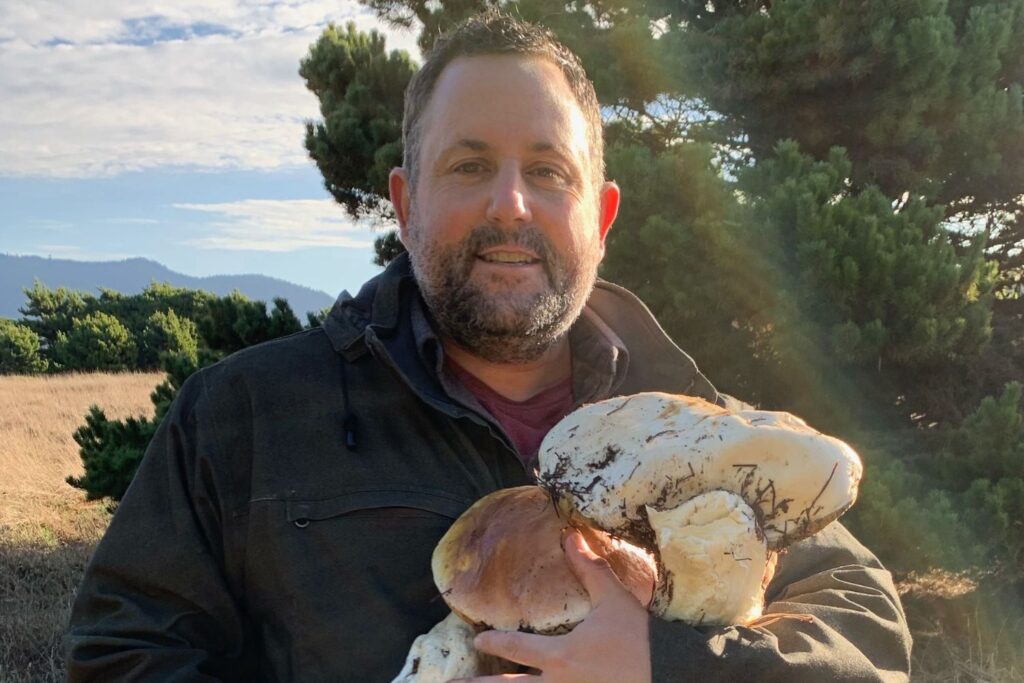
Embracing the “Mushroom Boom”
Even though Ian grew up surrounded by them, interest in mushrooms hasn’t always been mainstream. “The mushroom business wasn’t as glamorous or cool,” he recalls. “It was kind of geeky, to a degree. Now it seems like there are a lot more people who do have knowledge, who do realize just how beneficial they are. It’s like the industry has grown up a little bit, and it’s completely different from when I was a kid.”
Now, Far West Fungi is riding the wave of what Ian calls the “shroom boom” by connecting with newly interested consumers and creating innovative mushroom products. Ian says that the Mushroom Festival is an opportunity for mushroom-curious event-goers to come together and have conversations about fungi. It’s also a chance to say thanks to loyal supporters of the business.
“Our longtime customers shop with Foodwise, and they come to the market all the time. We’re really trying to give them something special for the day,” Ian says. Far West Fungi will be working with farmers to create recipes that include their mushrooms, and some farmers will offer a recipe that event-goers can take home for free after purchasing the ingredients.
Everyone is encouraged to come in costume and enjoy the festivities both inside the building and outside in the Ferry Plaza all weekend long, including a Mushroom Masquerade, trick-or-treating, and more.
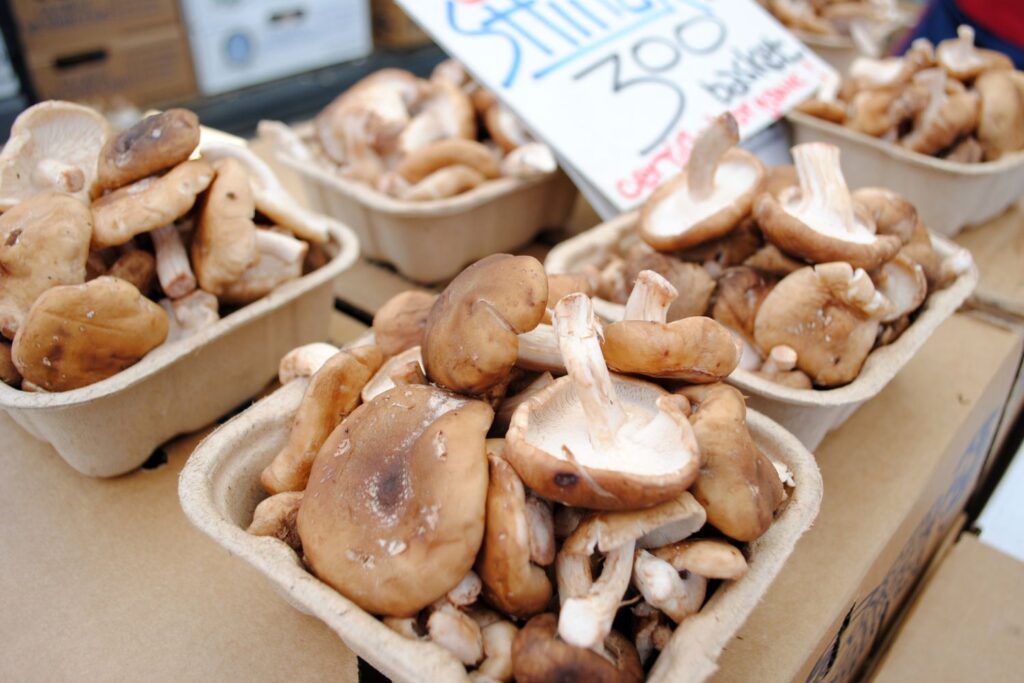
Keeping California Mushroom Growers in Business
Celebrating and supporting mushroom farmers by buying locally grown mushrooms is more important than ever. “When I started as a kid,” Ian says, “there were probably about 14 different mushroom farms in the Central Coast and around our area, growing whites, browns, and portobellos.”
However, this number is dwindling. “One of the bigger mushroom farms, Monterey Mushrooms, is closing their facility in Watsonville that grows 600,000 pounds of mushrooms in one week.” This is far greater than the average amount of mushrooms that most farmers grow, including Far West Fungi, and it indicates a greater decline overall. Now, Ian says, there are only two mushroom farms left after four closed down earlier this year.
Local mushroom growers have also faced the challenge of making sure buyers understand who grows their mushrooms in California, and who imports the spores from other countries. Earlier this year, Far West Fungi sponsored a bill that would have ensured that mushrooms grown from imported spores could not be labeled as locally grown.
“It has to do more with the fact that there is so much pressure from Canada exporting the product,” Ian says, and because of this, he emphasizes the importance of supporting local mushroom farmers to keep California’s lively community of mushroom cultivation alive.
Join Far West Fungi for the Ferry Building Mushroom Festival, taking place October 24-27. On Saturday, October 26, at the Ferry Plaza Farmers Market, stop by the Far West Fungi Cafe Pop-Up and look for mushroom specials throughout the market.
Support Far West Fungi on Saturdays in the Ferry Plaza Farmers Market, and Mission Community Market on Thursdays.
Topics: Environment, Events, Family, Farmers market, Farms
